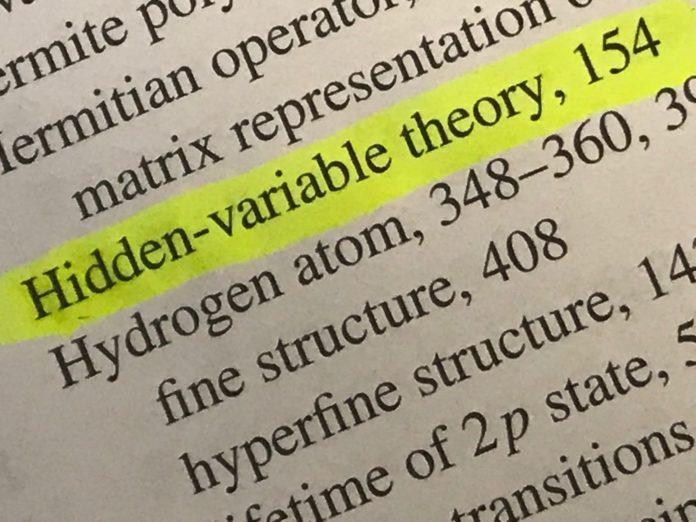“I am convinced God does not play dice with the universe.” – Albert Einstein
Quantum Mechanics, despite how fancy and scifi-esque it sounds, is not a new concept. The “revolution” began in the beginning of the 1900s with Maxwell Planck’s theory that energy is quantized into “packets” called quanta, and has remained at the forefront of scientific discovery to the present day. The majority of the scientific community generally believes that Quantum Mechanics accurately describes the universe, but not everyone. In fact, Albert Einstein, himself, was not convinced of the completeness and accuracy of Quantum Theory. In fact, one of Einstein’s most famous quotations: “I am convinced God does not play dice with the universe.” was him expressing wariness of Quantum Theory, despite his work creating it. He was a champion of an idea that has become known as “Hidden Variable Theory”, an idea that persists to this day. But in order to learn what Hidden variable Theory actually is, we have to better understand what quantum mechanics is, and its difference from classical mechanics.
You, as a person, have lots of experience dealing with Classical mechanics. Classical mechanics are the “laws of physics” that govern the world you are familiar with. Momentum, acceleration, orbits, forces, without meaning to, we come into contact with classical mechanics every day. Everything from the moon in the sky to the friction stopping your car from rear-ending the car in front of you, to a cornerback making the game-saving tackle at the end of the football game are governed by the laws of classical mechanics. And one important quality of classical mechanics is that it is deterministic. This means that that given all the information about a situation, you can predict what is going to happen. For example, we know, at any given moment, where the moon is in the sky. We know where the moon will be in the sky in 100 year from now because we understand the gravitational interaction between the earth and the moon, and based on the mass of both of the bodies, and their distance from each other, and the orbital speed, we know the path the moon will take for centuries to come. And it is incredible accurate too. At midnight (eastern standard time) on April 2, 3019 the moon will be 19.49% full.
Quantum Mechanics, however, is not deterministic. Using quantum mechanics, we cannot predict the outcome of the situation with 100% accuracy. Instead, Quantum Mechanics is probabilistic. This means that we can determine the outcome that is most likely to occur, but we still do not know exactly what will happen. We just know the odds. (don’t tell Han). Quantum Mechanics govern the world of incredible small things. In systems nearly atomic in size, the laws of classical mechanics begin to break down, and a new, strange, law rules. And this law is very counter-intuitive, and because of this has faced a lot of backlash. Quantum Mechanics being probabilistic is the chief reason Einstein and other physicists have a problem with quantum mechanics, and is the motivation behind the Hidden Variable Theory.
Imagine you are at a baseball game. Surrounded by fans and the smell of popcorn, you intently watch the pitcher throw pitch after pitch. Now imagine you had no idea what air was. The air is still there, of course, but in your mind, the pitcher’s hand is the only thing that affects the ball. The pitcher will pitch each ball exactly the same, but the ball will not always end up at the same place. Of course, most of the pitches would end up in the strike zone, but some won’t be. Some balls will curve, while others fly straight, some will be faster, slower, some will fly right down the middle and others will fly wayward. We cannot determine exactly where each pitch will end up, but we can say where it will most likely end up. This is probabilistic.
Now imagine the same situation, but you are now aware of air. You understand how the spin of the ball interacts with the air to curve the ball, and aware how air currents and wind changes the path of the ball. With this new information, this new variable in the equation, we can now determine exactly where each pitch will end up. The discovery of this new variable turns the probabilistic system into a deterministic one. This is the main idea of Hidden Variable Theory, that Quantum Mechanics is incomplete, and some hidden variable, will make the it deterministic.
Probabilistic systems are so foreign to us. The laws of physics we learned in high school and we have come in contact with are all deterministic, so it is only natural to think that if Quantum Mechanics is not deterministic, then it is only because we do not fully understand it. The search for this hidden variable persists to this day, albeit without success. Quantum Mechanics has proved to be very accurate when applied to a wide array of systems. The allure of this idea in understandable, after all, it makes sense, deterministic systems are familiar to us, and some of the brightest minds in history have dedicated years to finding this hidden variable. We do not know if God truly does play dice with the universe, but maybe the dice in its own way brings an elegance and beauty to the cosmos that would otherwise be so predictable.
Genovese, M. (2007, January 12). Research on Hidden Variable Theories: A review of recent progresses. Retrieved March, 2019, from https://arxiv.org/abs/quant-ph/0701071
Look Up the Moon Phase for Any Date. (n.d.). Retrieved March, 2019, from https://www.moonpage.com/index.html?go=T&auto_dst=T&tzone=et&m=4&d=2&y=3019&hour=0&min=0&sec=0Maguire, S. (2012, November 12).
It’s been a tough week for hidden variable theories. Retrieved March, 2019, from https://quantumfrontiers.com/2012/11/08/its-been-a-tough-week-for-hidden-variable-theories/
Townsend, J. S. (2012). A modern approach to quantum mechanics. Sausalito, CA: University Science Books.
Uzer, A. T. (2018). Introduction to Quantum Mechanics. Lecture presented in Georgia Institute of Technology.
